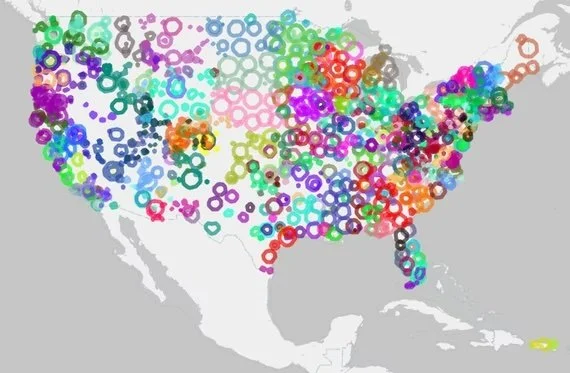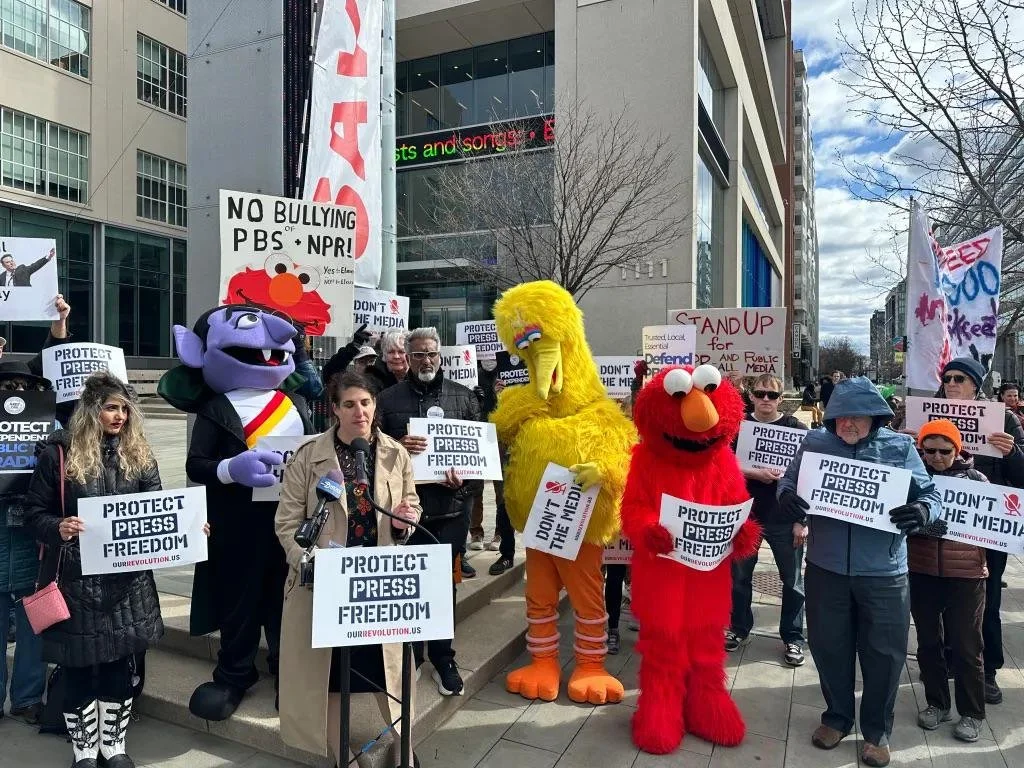I’m outraged, disappointed, and deeply concerned about the impact on our democracy of the decision by the Republican majority of the US Congress to greatly weaken our country’s only public media institutions — PBS and NPR stations — which serve every community in this country with trusted news and noncommercial high quality programming, and play a key role in keeping communities, small and large, informed, educated, and protected in emergencies.
For me and the millions of other Americans who understand the connection between their local PBS and NPR stations and access to local news and sometimes life saving information; who value the outstanding dramas, the important documentaries, the educational and safe children’s programs; and who recognize the negative impact of their loss on communities and on our democracy, this is an indefensible decision.
The truth is that the defunding of public media has been a conservative objective for more than 50 years, nearly going back to its founding in 1967 when a small but committed group of concerned citizens petitioned Congress to put aside some of the public spectrum, the airwaves that belong to the public, for noncommercial television and radio.
As commercial media grew in size and power — and remember there were only three national broadcast networks at that time — there was a realization of the need to create a similar “network” of local stations that could support a national programming schedule but whose priority would be to serve the communities where they were located. The mission was to use the public spectrum to serve the public and not to “sell” products to generate revenue for corporate shareholders.
Designer Andrew Filer mapped the reach of public radio stations in the US, based on data from Wikipedia and the station search from the Federal Communications Commission.
That is the distinction that matters more today than ever when there are hundreds of media networks and platforms — all of them with one bottom line: returning profits to owners. That’s all fine, and I don't mean to imply that good, informative, entertaining, and inspiring programming can’t be found on commercial networks or streaming services, but this distinction — for profit vs. nonprofit — is important. Even in a media ecosystem with more choices than ever, surely there is room and an imperative in a democracy for one media choice with a different bottom line — public interests above profits.
I have watched with admiration the testimonies of current PBS President and CEO Paula Kerger and NPR's Katherine Maher making the case for why the federal funds matter to America’s only public service media and to remind Congress of the trust in both PBS and NPR that has been sustained and grown stronger, even as media choices multiplied. This public trust has always been public media’s best defense, a point I had to make often during my tenure as PBS President and CEO, as you’ll hear in this excerpt from a National Press Club speech.
Yes, despite years of declining trust in the media, current polling finds that trust in PBS and NPR is as high in 2025 as it was in 2005 when I made that speech.
From the beginning, there have been those who questioned the allocation of taxpayer funds for public media and congressional funding has often been challenged.
But time and time again, the funding would survive these efforts to weaken public media by ending the small but critical congressional funding — it’s less than 15% of PBS’s national budget, but a much larger portion of the budgets of many local stations, especially those serving rural communities.
We survived many of the previous efforts on Capitol Hill because beloved PBS figures like Mr. Rogers and Big Bird would make appearances at committee hearings and a deluge of “Save Sesame Street” and “Protect Mr. Rogers’s Neighborhood” calls would come from the constituents of these elected officials.
Sadly, nothing and no one could stop the momentum put into place with new vigor by the current president and enacted by a majority of Congress seemingly more concerned about pleasing Donald Trump than preserving important educational and noncommercial programming for children and families or even acknowledging the well documented support among their constituents for public television and radio’s programming and services.
Only two Republican senators, Murkowski and Collins, voted against the bill; every other Republican senator voted for it. Murkowski reminded her colleagues that local NPR stations provide crucial emergency warnings and public safety information during extreme weather events and other disasters, referencing a 7.3 magnitude earthquake in Alaska earlier this month that triggered a tsunami warning as an example. That earthquake luckily resulted in little damage and the tsunami warning was quickly canceled, but as Murkowski noted in her statement, “as we see life threatening natural disasters occur more frequently around the country, that will not always be the case.”
“My colleagues are targeting NPR but will wind up hurting — and, over time, closing down — local radio stations that provide essential news, alerts and educational programming in Alaska and across the country,” she said.
Sen. Eric Schmitt, R-Mo., disagreed. “I know that’s a scary situation in Alaska, but the good news is FEMA money will be there for these sort of alerts,” he said.
IIt certainly wasn't there for Kerr County, Texas. And as NPR has reported, “funding prospects for communities at risk are getting even more limited. The Trump administration has frozen or canceled billions of dollars dedicated to help communities prepare for disasters. Trump signed an executive order saying states should be responsible for funding disaster preparedness, instead of the federal government.”
We have many examples of why these cuts in federal funds for FEMA and public media aren’t saving lives or property, and the fight to save both just got harder.
It has always been the case that PBS stations are supported in the main “by viewers like you,” but the federal funding is not just significant to sustain local services and keep national programming at the quality level that is expected and valued, it is also an important sign of commitment from a democracy to support a free and open and locally responsive media enterprise, one that can resist political pressures to censor news, restrict access to information, and to cancel programs that might displease those in power.
Consider, for example, what happened to Stephen Colbert’s Late Night show on CBS — canceled last week, adding to the concerns that any and all platforms for dissent, including comedy, can become targets and are vulnerable to cancellation. CBS claims the cancellation was a financial decision — but the truth seems to be that CBS and the network’s corporate owner, Paramount, caved to President Trump’s disapproval of Colbert.
CBS had already agreed to settle Trump’s lawsuit over “60 Minutes” with a $16 million donation to his presidential library. Last week, Trump claimed that Paramount-Skydance had also pledged $20 million in airtime for Trump administration PSAs. Clearly, such partisan, business-only driven decisions are more evidence of the imperative for a democracy to protect media organizations that don’t have to make decisions based primarily on financial concerns or in response to political pressures.
To protest such decisions, many on social media have recommended viewers cancel CBS and Paramount accounts and send that money instead to local PBS or NPR stations to sustain the single media enterprise that should remain free of both pressures and influences — and can do that best with more public support.
In the days following the vote in Congress, many on social media shared the video clip of Mr. Rogers testifying before Congress in 1969 when President Nixon and other Republicans were threatening to cut public media funding. He saved the funding that day.
Listening to him talk about the importance of empathy, the power of kindness, and the need for good neighbors in his testimony, I was struck by how far we've come as a country, where cruelty, pettiness, and belittling have replaced empathy, kindness, and concern for our neighbors. The politicization of everything has either numbed us into acceptance or led to ‘anticipatory obedience’ based on fear of reprisals.
Where is the outrage when our neighbors are losing their jobs; when lives and property and livelihoods are being lost to climate catastrophes while emergency services are being cut; when funding and programs for moving towards a climate safe and sustainable future are being rolled back; when the few places where truth and facts are the guardrails (and not opinions or ratings) are being canceled or weakened?
Where is the public’s voice being heard in a democracy that is based on trust in an informed and free citizenry?
The fight to save public media is not over. Many lawmakers said they would be open to restoring some funding for PBS and NPR, so it's important for all of us to tell our representatives that public media is necessary — for the public safety concerns related above and the continuing demise of local news outlets across the country.
Find out how you can get involved and take action at ProtectMyPublicMedia.org.
There are many, many frontlines in today’s America, and the need is greater every day for brave advocates and activists to speak up, to show up, and to stand in solidarity to save what we value and most importantly, to demand what is needed to secure the future of a habitable planet and a functioning, healthy democracy that serves all the people.
Onward!
- Pat





